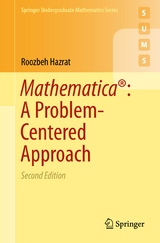Mathematica
A Problem-centered Approach
Seiten
2010
Springer London Ltd (Verlag)
978-1-84996-250-6 (ISBN)
Springer London Ltd (Verlag)
978-1-84996-250-6 (ISBN)
- Titel erscheint in neuer
- Artikel merken
Zu diesem Artikel existiert eine Nachauflage
An introduction to the vast array of features and powerful mathematical functions of Mathematica that uses a multitude of clearly presented examples and worked-out problems that enable the reader to learn from the codes and avoids lengthy explanations.
Mathematica(R): A Problem-Centered Approach introduces the vast array of features and powerful mathematical functions of Mathematica using a multitude of clearly presented examples and worked- out problems. Each section starts with a description of a new topic and some basic examples. The author then demonstrates the use of new commands through three categories of problems - the first category highlights those essential parts of the text that demonstrate the use of new commands in Mathematica whilst solving each problem presented; - the second comprises problems that further demonstrate the use of commands previously introduced to tackle different situations; and - the third presents more challenging problems for further study. The intention is to enable the reader to learn from the codes, thus avoiding long and exhausting explanations. While based on a computer algebra course taught to undergraduate students of mathematics, science, engineering and finance, the book also includes chapters on calculus and solving equations, and graphics, thus covering all the basic topics in Mathematica.
With its strong focus upon programming and problem solving, and an emphasis on using numerical problems that do not need any particular background in mathematics, this book is also ideal for self-study and as an introduction to researchers who wish to use Mathematica as a computational tool. Mathematica(R): A Problem-Centered Approach comes with a free 30 day trial of the Wolfram Mathematica(R) software'
Mathematica(R): A Problem-Centered Approach introduces the vast array of features and powerful mathematical functions of Mathematica using a multitude of clearly presented examples and worked- out problems. Each section starts with a description of a new topic and some basic examples. The author then demonstrates the use of new commands through three categories of problems - the first category highlights those essential parts of the text that demonstrate the use of new commands in Mathematica whilst solving each problem presented; - the second comprises problems that further demonstrate the use of commands previously introduced to tackle different situations; and - the third presents more challenging problems for further study. The intention is to enable the reader to learn from the codes, thus avoiding long and exhausting explanations. While based on a computer algebra course taught to undergraduate students of mathematics, science, engineering and finance, the book also includes chapters on calculus and solving equations, and graphics, thus covering all the basic topics in Mathematica.
With its strong focus upon programming and problem solving, and an emphasis on using numerical problems that do not need any particular background in mathematics, this book is also ideal for self-study and as an introduction to researchers who wish to use Mathematica as a computational tool. Mathematica(R): A Problem-Centered Approach comes with a free 30 day trial of the Wolfram Mathematica(R) software'
Defining functions.- Lists.- Changing heads!.- A bit of logic and set theory.- Sums and products.- Loops and repetitions.- Substitution, Mathematica rules.- Pattern matching.- Functions with multiple definitions.- Recursive functions.- Linear algebra.- Graphics.- Calculus and equations.- Solutions to the Exercises.
| Reihe/Serie | Springer Undergraduate Mathematics Series (SUMS) |
|---|---|
| Zusatzinfo | 13 black & white illustrations, 50 colour illustrations, biography |
| Verlagsort | England |
| Sprache | englisch |
| Maße | 156 x 234 mm |
| Gewicht | 650 g |
| Themenwelt | Mathematik / Informatik ► Informatik ► Programmiersprachen / -werkzeuge |
| Informatik ► Theorie / Studium ► Algorithmen | |
| Mathematik / Informatik ► Mathematik ► Allgemeines / Lexika | |
| Mathematik / Informatik ► Mathematik ► Computerprogramme / Computeralgebra | |
| ISBN-10 | 1-84996-250-2 / 1849962502 |
| ISBN-13 | 978-1-84996-250-6 / 9781849962506 |
| Zustand | Neuware |
| Informationen gemäß Produktsicherheitsverordnung (GPSR) | |
| Haben Sie eine Frage zum Produkt? |
Mehr entdecken
aus dem Bereich
aus dem Bereich
Buch | Softcover (2025)
Lehmanns Media (Verlag)
CHF 62,95
die Welt der generativen KI verstehen
Buch | Hardcover (2025)
Hanser (Verlag)
CHF 48,95
IT zum Anfassen für alle von 9 bis 99 – vom Navi bis Social Media
Buch | Softcover (2021)
Springer (Verlag)
CHF 46,15





